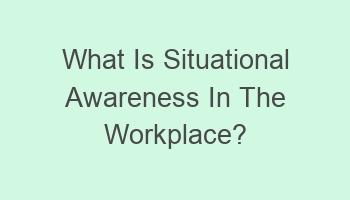What Is Situational Awareness In The Workplace?

Situational awareness in the workplace is the ability to perceive and understand one’s surroundings. It involves being alert, observant, and proactive in identifying potential hazards or opportunities. Situational awareness helps employees make informed decisions, anticipate changes, and respond effectively to emergencies. By staying vigilant and attentive, workers can prevent accidents, improve productivity, and enhance overall safety. Understanding situational awareness in the workplace is crucial for creating a positive and secure work environment. It involves being aware of people, objects, events, and the overall atmosphere. Developing strong situational awareness skills can lead to better communication, collaboration, and problem-solving among team members. Ultimately, situational awareness in the workplace plays a vital role in ensuring organizational success and employee well-being.
Contents
| Situational awareness is being aware of your surroundings and potential hazards in the workplace. |
| Being alert and observant can help prevent accidents and injuries at work. |
| Recognizing changes in the environment can help you respond effectively in emergencies. |
| Training employees on situational awareness can improve overall safety in the workplace. |
| Practicing good communication among coworkers can enhance situational awareness. |
- Using technology like sensors and alarms can enhance situational awareness in the workplace.
- Regularly assessing and updating safety procedures can improve situational awareness.
- Encouraging reporting of potential hazards can help maintain a high level of situational awareness.
- Implementing a reward system for employees who demonstrate good situational awareness can motivate others.
- Ensuring clear evacuation routes and emergency procedures can enhance situational awareness during crises.
What Is Situational Awareness In The Workplace?
Situational awareness in the workplace refers to the ability of individuals to perceive, process, and understand critical information about their surroundings. It involves being aware of what is happening around you, anticipating potential risks or opportunities, and making informed decisions based on the current situation.
- Perception: Situational awareness starts with perception, which is the ability to observe and gather information from your environment.
- Comprehension: Once you have gathered information, you need to interpret and understand what it means in the context of your work environment.
- Projection: After understanding the situation, you should be able to predict future outcomes and anticipate any potential challenges.
Why Is Situational Awareness Important In The Workplace?
Situational awareness is crucial in the workplace as it helps employees and organizations to identify and respond to potential risks, prevent accidents, improve decision-making, and enhance overall productivity.
| Risk Management: By being aware of their surroundings, employees can identify hazards and take necessary precautions to prevent accidents. |
| Decision-making: Situational awareness enables individuals to make quick and informed decisions, especially in high-pressure situations. |
How Can Situational Awareness Be Improved In The Workplace?
Improving situational awareness in the workplace involves training employees to be more observant, encouraging open communication, fostering a culture of safety, and utilizing technology to enhance awareness.
- Training Programs: Organizations can conduct regular training sessions to educate employees on the importance of situational awareness and provide them with the necessary skills to enhance their awareness levels.
When Should Situational Awareness Be Practiced In The Workplace?
Situational awareness should be practiced at all times in the workplace, especially in high-risk environments such as construction sites, manufacturing plants, or healthcare facilities where accidents can occur due to lack of awareness.
| Emergency Situations: During emergencies or crisis situations, it is crucial for employees to maintain high levels of situational awareness to ensure their safety and the safety of others. |
Where Can Situational Awareness Training Be Conducted In The Workplace?
Situational awareness training can be conducted in various settings within the workplace, including classrooms, simulation labs, on-site training areas, or through online platforms.
- Simulation Labs: Organizations can set up simulation labs to recreate real-world scenarios and train employees on how to respond effectively in different situations.
Who Is Responsible For Promoting Situational Awareness In The Workplace?
Responsibility for promoting situational awareness in the workplace lies with both employees and employers. Employers should provide training and resources, while employees need to actively practice and maintain awareness.
| Employers: Employers are responsible for creating a safe work environment, providing necessary training, and promoting a culture of awareness and safety. |
| Employees: Employees should actively participate in training programs, follow safety protocols, report any hazards, and stay vigilant in their work environment. |
What Are The Benefits Of Situational Awareness Training In The Workplace?
Situational awareness training in the workplace offers various benefits, including improved safety, reduced accidents, enhanced decision-making, increased productivity, and better overall performance.
- Safety: By increasing awareness levels, employees can identify and mitigate risks, reducing the likelihood of accidents and injuries.
Which Industries Can Benefit From Situational Awareness In The Workplace?
Various industries can benefit from incorporating situational awareness in the workplace, including healthcare, construction, manufacturing, transportation, emergency services, and security.
| Healthcare: Healthcare professionals need to be highly aware of their surroundings to ensure patient safety and provide efficient care. |
| Emergency Services: First responders rely on situational awareness to assess and respond to critical situations effectively. |